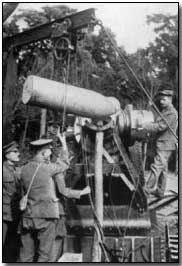Memoirs & Diaries - War is War - Censorship and Broken Cities
 As a
writer, Burrage found censorship annoying, but he found a way out. "I
wrote home to my mother describing the wreck of Monchy-au-Bois, and was
heartily rebuked for mentioning the village by name... So I wrote another
letter in which I said that I mustn't mention the village by name, in case
the Germans found out there had been a battle there.
As a
writer, Burrage found censorship annoying, but he found a way out. "I
wrote home to my mother describing the wreck of Monchy-au-Bois, and was
heartily rebuked for mentioning the village by name... So I wrote another
letter in which I said that I mustn't mention the village by name, in case
the Germans found out there had been a battle there.
"The problem of censorship was an acute one to me. It was well enough to write a short story, but the difficulty was to get it censored. Officers were shy of tackling five thousand words or so, written in indelible pencil... there were 'green envelopes' which could be sent away sealed and were liable only to censorship at the base, but these were only sparingly issued... I met an A.S.C. lorry driver who had stolen enough green envelopes to last me for the rest of the war; and since he only wanted two francs for them I was free of the censorship from that day forward."
He continued to write magazine fiction to support his family. "It was a great relief to me to write when it was at all possible - to sit down and lose myself in that pleasant old world I used to know and pretend to myself that there never had been a war. Some of my editors seemed of the opinion that we were not suffering from one now. One... used to write to me saying "Couldn't you let me have one of your light, charming love stories of country house life by next Thursday." I would get these letters in the trenches during the usual 'morning hate' when my fingers were too numb to hold a pencil, when I was worn out with work and sleeplessness, and when I was extremely doubtful if there ever would be another Thursday."
One of Burrage's first postings was to a sector of the front near Arras in early 1917: "Who will ever forget Arras who saw her then in the middle days of the war? The whole rows of houses with their facades torn off so that one could see into every room, as in an architect's sectional drawing; pictures hanging askew, beds with the clothes dragged aside and left just as when their occupants leaped up and ran for safety, perhaps more than a year since; open wardrobes and garments still hanging on the pegs; intimate medical appliances left ruthlessly exposed... Arras was a more poignant sight than Ypres. Ypres was a bleeding corpse and Arras was still writhing in her death agony."
He was ambivalent about the French peasantry but appreciated the predicament they were in. Behind the lines they often provided a few hours of solace in a warm cottage where he and his mates could have a hot omelette and some wine. At other times he was less taken with them.
"The inhabitants come out to inspect us with that kind of bovine interest which attracts cows to strange dogs. We have been standing between the enemy and their homes, but they have no enthusiasm for us. Why should they have? They have got used to us... They are merely hoping that we will halt, and that they will be able to sell us their poisonous white wine at three hundred percent profit. I did not last until the end of the war, so I never entered a recaptured village linked by the arm to a girl, with her hat dangling from my bayonet. Times like those must have been worth living for."
Next - Guns, Guns, Guns
Photographs courtesy of Photos of the Great War website
A 'Gearsman' was a tank crew member responsible for managing the gears.
- Did you know?
